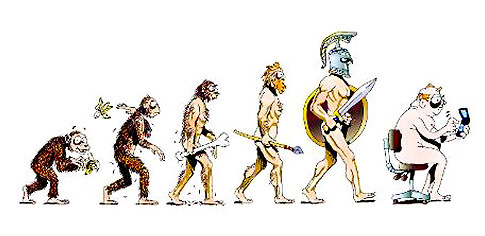
The paleo diet has been popular for a while now, and it prescribes a “back to nature” way of eating that’s interesting. The premise is that humans evolved in an environment devoid of processed foods and high-glycemic carbs, so we should eat a diet that more closely mimics our paleolithic ancestors. I’m not going to try to defend the paleo diet per se, some people lose weight on it, whatever. But it’s an interesting framework for considering what environments we as humans are adapted to and how we can apply that to the problems of modern life.
Consider depression. Two of the top cures for depression are exercise and light therapy. It’s clear that humans evolved for at least 100,000 years, largely outdoors, moving around in the sunlight. Depression is probably best thought of as a disease of modern life, where we’re living indoors and are largely sedentary.
Another aspect of modern, developed cultures is social isolation. Humans are social animals, and we arguably evolved in tribes of roughly 150 members, according to the Dunbar number. (I know that Dunbar has been supplanted by newer research, let’s just use this number as a starting point.)
Depression is probably best thought of as a disease of modern life, where we’re living indoors and are largely sedentary. . . Another aspect of modern, developed cultures is social isolation. . . So let’s consider these three aspects of an evolved human lifestyle: 1) Living outdoors in the sun, 2) Moving around continually, and 3) Being surrounded by a community of other humans invested in our survival. These are all things that many of us struggle with in modern life.
So let’s take these three aspects of an evolved human lifestyle: 1) Living outdoors in the sun, 2) Moving around continually, and 3) Being surrounded by a community of other humans invested in our survival. These are all things that many of us struggle with in modern life. Sure, maybe some people still live in tight-knit, traditional farm communities that fulfill these needs, but, here in the US, economic forces have largely broken the cohesion of these rural places and we see drug abuse epidemics as a consequence.
Transhumanists can rightly argue that our need for sunlight, exercise, and social support are just kludgy legacy code tied to our messy biological bodies. Maybe we can upgrade humans to be more machine-like with replaceable parts and we can do away with these outdated needs. That’s a valid argument. I don’t happen to agree with it, but it’s coherent at least. For the sake of this discussion, I ask my transhumanist friends to acknowledge that these human 2.0 upgrades don’t seem to be right around the corner, so it probably makes sense to make accommodations for the hardware we humans are running right now.
Hippies tried to solve the problems of modern life in the sixties with their back to nature movement. . . But what ever happened to that movement, anyway? . . I asked a fellow named Frosty, an old hippie scientist at one of my clients, who said that when his friends from the city showed up at the rural commune, they blanched at how much work needed to be done. They didn’t have the skills needed to build structures by hand, grow food, or dig latrines. And then they would look around and ask, “Where’s the bar?” They wanted to get drunk and hang out. Who can blame them?
Hippies tried to solve the problems of modern life in the sixties with their back to nature movement. Good old Stewart Brand was in the thick of it with his Whole Earth Catalog. Many long-haired freaks trekked out to the middle of nowhere to build geodesic domes out of logs and get naked in the mud together. Awesome!
But what ever happened to that movement, anyway? What went wrong? Brand himself said at a Long Now talk that the hippies discovered that the cities were where the action was. I’m fortunate to work with these old hippie scientists at one of my clients, and I asked a fellow named Frosty why the back to nature movement didn’t properly take hold. He laughed and said that when his friends from the city showed up at the rural commune, they blanched at how much work needed to be done. They didn’t have the skills needed to build structures by hand, grow food, or dig latrines. And then they would look around and ask, “Where’s the bar?” They wanted to get drunk and hang out. Who can blame them?
Twentieth century communists in Asia attempted their own versions of the back to nature movement. They took what appears to be a sound hypothesis and effectively implemented it as genocide. Mao’s Cultural Revolution forced the relocation of city dwellers to the countryside, resulting in disaster. Pol Pot’s Year Zero also involved a violent reset of the clock, trying to turn back time and force modern people to live as our ancestors did, also a terrible failure. So yes, as Scott Alexander says, we “see the skulls.” We need to learn the lessons of previous failed attempts before we can rectify the problems with modern life.
Cities are where the power is accumulating. Cities are more energy efficient. Cities are where the action is. But how can we remake our lifestyles to fit them? . . We see the first glimmers of a solution with Silicon Valley’s obsession with social, mobile, and augmented reality. . . Maybe augmented reality will give us the ability to move freely around the city, connect with our communities, and still do modern work, but while getting exercise and sunlight at the same time. Call it the “Back to the City, But Working Outside, Walking Around Movement?” Not catchy, but you get the picture.
We can’t turn back the clock. We have to start where we are and assume that progress will keep happening whether we like it or not. Cities are where the power is accumulating. Cities are more energy efficient. Cities are where the action is. But how can we remake our lifestyles to fit them? We see the first glimmers of a solution with Silicon Valley’s obsession with social, mobile, and augmented reality. Perhaps we can find our communities via social network technology. I certainly feel vastly enriched by my East Bay Futurists Meetup. I’ve made good friends there, who help me grow and teach me a lot. Mobile technology has made it easier and easier for people to do real work on the move. Maybe augmented reality will close the loop and give us the ability to move freely around the city, connect with our communities, and still do modern work, but while getting exercise and sunlight at the same time. Call it the “Back to the City, But Working Outside, Walking Around Movement?” Ahh, well, not catchy, but you get the picture. We just need to start redesigning our cities a little bit. Step One: More parks!

